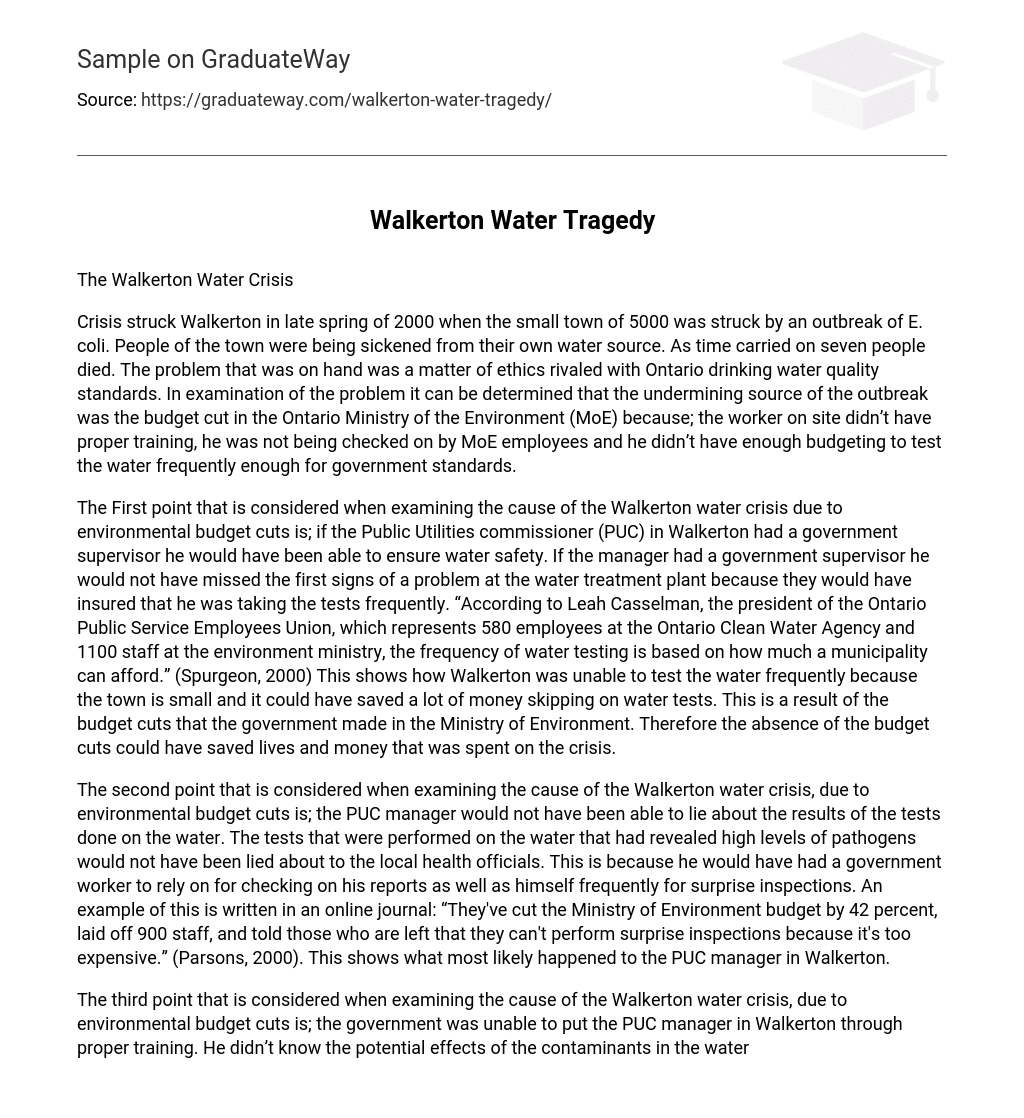The Walkerton Water Crisis
Crisis struck Walkerton in late spring of 2000 when the small town of 5000 was struck by an outbreak of E. coli. People of the town were being sickened from their own water source. As time carried on seven people died. The problem that was on hand was a matter of ethics rivaled with Ontario drinking water quality standards. In examination of the problem it can be determined that the undermining source of the outbreak was the budget cut in the Ontario Ministry of the Environment (MoE) because; the worker on site didn’t have proper training, he was not being checked on by MoE employees and he didn’t have enough budgeting to test the water frequently enough for government standards.
The First point that is considered when examining the cause of the Walkerton water crisis due to environmental budget cuts is; if the Public Utilities commissioner (PUC) in Walkerton had a government supervisor he would have been able to ensure water safety. If the manager had a government supervisor he would not have missed the first signs of a problem at the water treatment plant because they would have insured that he was taking the tests frequently. “According to Leah Casselman, the president of the Ontario Public Service Employees Union, which represents 580 employees at the Ontario Clean Water Agency and 1100 staff at the environment ministry, the frequency of water testing is based on how much a municipality can afford.” (Spurgeon, 2000) This shows how Walkerton was unable to test the water frequently because the town is small and it could have saved a lot of money skipping on water tests. This is a result of the budget cuts that the government made in the Ministry of Environment. Therefore the absence of the budget cuts could have saved lives and money that was spent on the crisis.
The second point that is considered when examining the cause of the Walkerton water crisis, due to environmental budget cuts is; the PUC manager would not have been able to lie about the results of the tests done on the water. The tests that were performed on the water that had revealed high levels of pathogens would not have been lied about to the local health officials. This is because he would have had a government worker to rely on for checking on his reports as well as himself frequently for surprise inspections. An example of this is written in an online journal: “They’ve cut the Ministry of Environment budget by 42 percent, laid off 900 staff, and told those who are left that they can’t perform surprise inspections because it’s too expensive.” (Parsons, 2000). This shows what most likely happened to the PUC manager in Walkerton.
The third point that is considered when examining the cause of the Walkerton water crisis, due to environmental budget cuts is; the government was unable to put the PUC manager in Walkerton through proper training. He didn’t know the potential effects of the contaminants in the water that he was disinfecting. Had he known the effects that the pathogens in the contaminated water could do to people, the situation would have been taken more seriously. An example of this is taken from the “Report of the Walkerton Inquiry”: “For example, Philip Bye, the Owen Sound district supervisor; Michelle Zillinger, the 1998 inspector; and John Earl and Larry Struthers, the two other environmental officers who dealt with Walkerton, were all unaware that E. coli was potentially lethal.” (O’Connor, 2002). It continues to say that basically we as a community should be educating the people in charge of things (such as water treatment in this case) to fully understand what they are doing before they are able to do it. In conclusion we can determine that the source of the E. coli outbreak was due to the budget cutbacks made in the MoE because; it left the PUC manager in Walkerton with insufficient training, MoE officials were not overseeing him, and there was not enough budgeting to frequently test the water for contaminants. There are many lessons that can be taken from the Walkerton tragedy. It was said, “This is the price you pay for a tax break.” (Parsons, 2000). This means in essence that there must be consequences for our actions and in this case there was a large consequence for a seemingly harmless action. The public does not take these types of consequences lightly especially when they concern health and safety. Maybe now the provincial government will always think twice before making large budget cutting decisions.
Sources
Spurgeon, David. “Budget cuts may have let to E coli outbreak.” British Medical
Journal 320 (2000) : 7250.
Parsons, Lee. “The Walkerton Tragedy and Ontario’s Water Crisis-some Political Lessons.” World Socialist Web Site. ICFI, 4 Nov. 2000. Web. 04 Oct. 2012. . O’Connor, Dennis R. Report of the Walkerton Inquiry. Toronto: Ontario Ministry of the Attorney General, 2002. Print.





